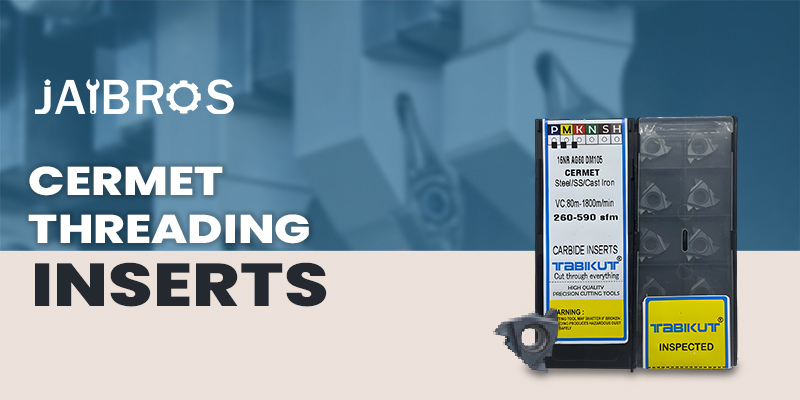Discover how CNC tools improve precision, speed, and quality in modern manufacturing, helping workshops and industries achieve accurate, efficient production
What Are CNC Tools?
The term CNC stands for “Computer Numerical Control.” Simply speaking, CNC machines can be thought of as just a piece of equipment or machine that is either cutting or shaping something based on commands that the machine interprets and acts on. Design is done by the computer and not by a human interface. The computer tells the machine where to move the tool, and the machine moves the tool according to the computer design that it was programmed to do. This takes human error out of the equation in the process of manufacturing. This gives the manufacturer the ability to ensure each piece is manufactured the same as all the other pieces.
CNC machines can accomplish many functions – cutting, drilling, shaping, grinding, and or finishing designs from materials such as metal, wood, or plastic. The equation works great for an operator because CNC machines work with programmed input, so they are able to produce complex designs that would be very difficult or impossible to produce by hand.
How to Use CNC Tools on Different Materials
To get the most out of CNC tools, you will want to use the best tooling for your material: carbide for metals, HSS or coated tooling for plastics, and so on. It is important to change your cutting speed, feed rate, and depth of cut based on your material as well. Always fix your workpiece correctly and use coolant as your material allows to prevent overheating. A good practice is to inspect your tool regularly for wear to maintain consistent accuracy and tool life.
Why CNC Tools Are Important in Manufacturing
CNC tools are vital not only for cutting and shaping materials. They bring consistency, speed, and reliability to the production process. For instance, a workshop is making hundreds of interchangeable machine parts. Each part must be identical. There must be some way to guarantee this level of accuracy. CNC machines continually repeat the same action over and over again, and produce the same accuracy each time.
Another important benefit they offer the consumer is time-saving. CNC systems can operate continuously without stopping – this gives the industrial consumer a greater opportunity to produce more of a product in a shorter period of time. Additionally, modern CNC machines can change tools automatically while the process is underway, and save the operator time so they can move from one to another.
Different Types of CNC Tools
CNC tools come in several styles for numerous applications. The common styles of CNC tools are:
- CNC milling tools which use a rotating cutter to cut or shape the material. The cutter can make flat surfaces, slots, or complex parts.
- CNC turning tools, which are found in a lathe. This type of machine has rotating material while the cutter cuts it to compose round or cylindrical parts.
- CNC drilling tools. The tool accurately creates holes in the material for either metal or plastic.
- CNC cutting tools. Highly sharpened tools that remove material from a workpiece to provide shape and finish.
- CNC grinding tools. Tools that polish and finish parts to a smooth surface.
Each tool cuts and shapes parts effectively for the application it is designed for. Each tool needs to be chosen based on the part to make (material), and for each type of machine, and the desired result.
Materials Used to Make CNC Tools
CNC tool quality varies greatly depending on what material is used to make the tool. There are essentially two types of materials:
- High-Speed Steel (HSS): This material is inexpensive and strong, and works well on softer metals and plastics.
- Carbide: A hard and heat-resistant material typically used with hard materials or under high-speed operation.
- Ceramics – compatible with fine materials with fine temp profiles
- Diamond-coated tools are excellent if you’re machining for ultra-precision at extremely small cuts or polishing applications. Generally, you will see diamond-coated tools in industries such as aerospace and electronics.
Carbide is a tooling material you will see in a machine shop since carbide tolerates heat in machining and holds a sharper edge longer than all other tooling materials.
How to Choose the Right CNC Tools
Selecting the right CNC tool for your job is one of the crucial decisions in any machining project. Poor tool selection can result in poor quality, tool wear, and even machine damage or failure. Here are some tips on the topic:
- Know Your Material: Every material behaves differently when it is cut. Steel, aluminium, and wood all require different tools.
- Examine Tool Coating: A coated tool will have less friction and wear, extending the tool’s life.
- Tool Geometry: Choose the shape and cutting angle you need for your machining process.
- Machine Type and Spindle Speed Compatibility: Ensure the tool is compatible with your machine type and spindle speed.
- Brand and Quality: Always go with a trusted brand, such as Jaibros, that provides tested and sturdy tools for all CNC applications.
Benefits of Using CNC Tools
Using high-quality CNC tools gives many advantages. They provide precise results, longer tool life, and smooth surface finishing. These tools also reduce manual labour and increase productivity. CNC machines can run 24 hours a day with minimal supervision, which makes them ideal for industries that need large-scale production.
Another important benefit is safety. Since most of the work is automated, the operator does not need to handle sharp or dangerous tools directly. This reduces the risk of accidents in the workshop.
Maintenance Tips for CNC Tools
Proper maintenance is the key to long tool life and better performance. Here are a few simple maintenance steps:
- Always clean tools after use to remove metal dust or chips.
- Store tools in dry, safe areas to prevent rusting.
- Check for wear or cracks before using them again.
- Use the correct coolant and cutting speed to avoid overheating.
- Regularly calibrate your CNC machine to maintain accuracy.
Following these small steps can save you money and prevent tool breakage.
Where to Buy Quality CNC Tools
Jaibros is one of the largest and most reliable brands in India for purchasing CNC tools. The brand sells a wide selection of CNC accessories, cutters, inserts, tool holders, and measuring tools. All of the products sold by Jaibros are tested and have passed standards for durability and performance in the marketplace. From a small shop owner to a corporate giant, Jaibros has all customers covered for reform under one roof.
Conclusion
CNC tools have revolutionized the process of machining and manufacturing in the present day. They provide accuracy, consistency, and efficiency for every task. It doesn’t matter if you are cutting metal or cutting a piece of plastic; the appropriate tool can greatly improve both time and quality. By utilizing reputable suppliers and maintaining your tools properly, you can ensure a productive workshop and longer-lasting tools.
Frequently Asked Questions (FAQs)
Q1. What are the functions of CNC tools?
CNC tools precisely cut, core, and shape materials. CNC tools help manufacturers create extremely precise components in all cutting applications, all over the place, whether you have a small machine shop or are using a larger industrial manufacturing process.
Q2. What is the best material for CNC tools?
For CNC tools, we would overall summarize, Carbide is the best material. Carbide is a very hard, very durable material, and it withstands very high heat during cutting or coring. In summary, Carbide lasts way longer than all other tool materials, and produces a (precision) finer cut or noble cut in cutting or boring.
Q3. What is the average lifespan for CNC tools?
This varies based on materials, how the CNC tool is used, and care for the CNC tools. In summary, good quality CNC tools should be able to be used for hundreds of cutting hours; carbide tools last much longer, assuming they are well cared for.
Q4. Can CNC tools be utilized formed-dimensions of metal and plastic?
Yes, CNC tools can easily be set up for either Metal and plastic or other materials. The cutting tool and cut speed can
Q5. Where would I be able to purchase quality CNC tools in India?
In India, Jaibros is a well-known supplier of CNC tools and can offer a range of quality CNC tools and accessories.



